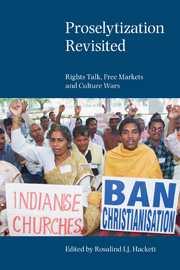Book contents
- Frontmatter
- Contents
- Preface and acknowledgements
- Contributors
- Revisiting Proselytization in the Context of Rights Talk, Free Markets and Culture Wars
- Section I
- Section II
- Section III
- Buddhism and the Politics of Conversion in Sri Lanka
- Merit and the Search for Inner Peace: the Discourses and Technologies of Dhammakaya Proselytization
- Asia's Antioch: Evangelica Christianity and Proselytism in Singapore
- False Consciousness and the Jargon of Authenticity: Religion and Nationalism in the Christianised Lowland Philippines
- Salvation through Secular Protest: the Development of Falun Gong Proselytization
- The Social and Legal Context of Proselytization in Contemporary Japanese Religions
- Section IV
- Section V
- Index
Buddhism and the Politics of Conversion in Sri Lanka
from Section III
- Frontmatter
- Contents
- Preface and acknowledgements
- Contributors
- Revisiting Proselytization in the Context of Rights Talk, Free Markets and Culture Wars
- Section I
- Section II
- Section III
- Buddhism and the Politics of Conversion in Sri Lanka
- Merit and the Search for Inner Peace: the Discourses and Technologies of Dhammakaya Proselytization
- Asia's Antioch: Evangelica Christianity and Proselytism in Singapore
- False Consciousness and the Jargon of Authenticity: Religion and Nationalism in the Christianised Lowland Philippines
- Salvation through Secular Protest: the Development of Falun Gong Proselytization
- The Social and Legal Context of Proselytization in Contemporary Japanese Religions
- Section IV
- Section V
- Index
Summary
Religious conversion, commonly viewed in the West in terms of personal experience and individual rights, has emerged as a source of major public debate and political struggle in Sri Lanka at the turn of the twenty-first century. Given the other challenges facing the Sri Lankan state at present— including a protracted civil war, post-tsunami reconstruction and rehabilitation, and serious disruptions to the national economy from rising oil prices and renegotiated textile trade agreements—it may seem somewhat surprising that the issue of religious conversion would become a pressing political issue. However, whereas those other problems are linked to concerns over the territorial sovereignty and economic wellbeing of the state, the current conflict over conversion in Sri Lanka is closely tied to disputes over the identity of the state. Debates over religious and national identities, human rights, cultural sovereignty, and the “foremost place” granted to Buddhism in the country's constitution frame the politics of conversion in Sri Lanka. One result of these debates is the sustained effort on the part of some actors to draft and pass legislation to make “unethical conversions” illegal in Sri Lanka. The Sri Lankan case makes clear that religious conversion is not simply a matter of individual faith and conscience, but it is, to quote Gauri Viswanathan, “among the most destabilizing activities in modern society, altering not only demographic patterns but also the characterization of belief as communally sanctioned assent to religious ideology” (Viswanathan 1998, xvi).
- Type
- Chapter
- Information
- Proselytization RevisitedRights Talk, Free Markets and Culture Wars, pp. 199 - 230Publisher: Acumen PublishingPrint publication year: 2008



